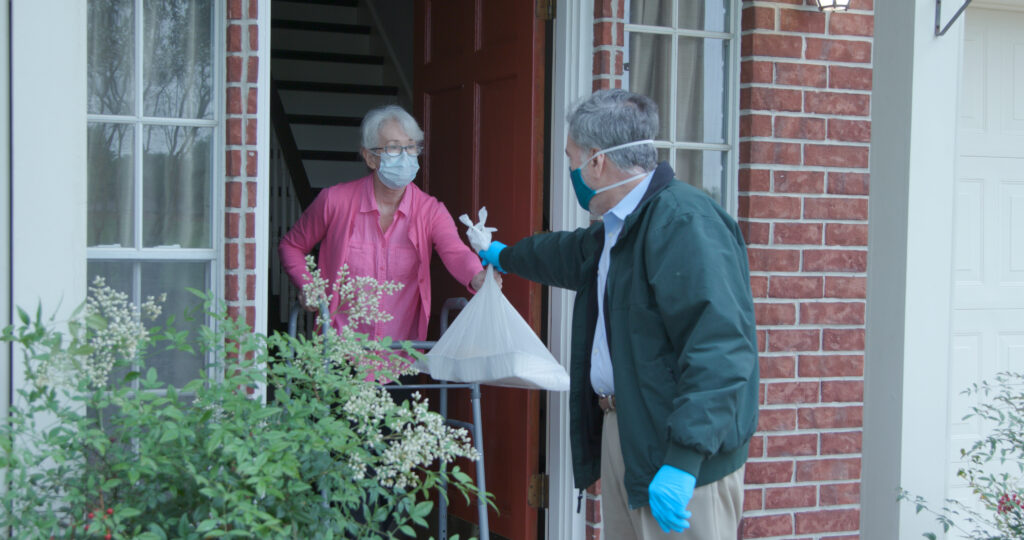While the elderly are at-risk and isolated during the pandemic, three new groups have started to help the elderly and keep them company.
The pandemic provides illustrative examples of how volunteers and philanthropy meet the challenges of our time. Consider, for example, the problem of how to help seniors in the COVID-19 crisis.
The Washington Post ran three stories showing different ways newly created nonprofits are helping seniors deal with the stresses caused by the coronavirus.
TEENS HELPING SENIORS
Consider the healthiest seniors, who still live in their own homes. In normal times they would not need help shopping. Many of these seniors are sheltering in place in their homes, since the more they step outside the more likely they are to catch the virus. How will these seniors get groceries—or prescriptions?
Teens Helping Seniors is filling the gap. As Teddy Amenabar reports, the organization was started in March, but already has affiliates in 14 states, and its first foreign chapter is being organized in Montreal.
Dhruv Pai and Matt Casertano, students at Montgomery Blair High School in Silver Spring, Maryland, created the group. In March they began shopping for their grandparents. Then, when the schools were closed, they realized they had a good idea—and since, like many students who were now studying at home, they had more spare time, so they decided to expand.
Seniors register on the Teens Helping Seniors website. The teenage volunteer then works with a senior to coordinate a delivery time and answer any questions about the shopping list. The senior then leaves payment via cash or check or online via Vemno.
Occasionally the teenagers throw in something extra. One senior was pleasantly surprised when a teenager, as part of his delivery, provided an 85th birthday cake for free.
“That kind of blew my mind because the teen and the senior didn’t know each other,” Pai said. “I mean, they were strangers.”
RADIO RECLINER
Visit any retirement community and you’ll find plenty of activities to keep residents occupied. But with the pandemic forcing residents of these communities to stay in apartments or their homes, what can be done to provide residents with the connections severed by social distancing?
Radio Recliner provides one answer. It’s an online radio station whose DJs (Sassy Sara, Hattie With An Attitude, K Rock) are residents of retirement communities. It began with the communities run by Bridge Senior Living, but has since gone nationwide. Although Radio Recliner calls itself a “pirate radio station,” all the music-licensing companies get their fees. In the half-hour I listened, DJ Jersey Jack played standards from the 1940s by Glenn Miller and Tommy Dorsey and reminisced about a visit to Manhattan’s Starlite Ballroom, where he heard Harry James and his orchestra.
The station was the idea of Luckie, an ad agency with offices in Birmingham and Atlanta. The goal of the station, Luckie CEO Mitch Bennett told Adweek was “a way to turn radio into a kind of social media.”
Marc Fisher, writing in the Washington Post, says that for seniors, who might spend their days staring at a TV that delivers “a diet of disease and fear,” Radio Recliner offers hope.
Virginia Hawsey, 82, remembers being stuck at home in the summer in the 1940s to protect her against the polio epidemic, which primarily hurt the young. But being a DJ on Radio Recliner gives her an opportunity to mentally escape from her isolation.
“I don’t know with the virus if we’re going to get out anywhere this summer,” she says, “but one can always dream.”
CORONAVIRUS-ERA PEN PALS
Another way to deal with seniors’ isolation comes from an effort in Alexandria, Virginia, where 28 students at St. Stephen’s and St. Agnes prep school are regularly calling residents of the nearby Goodwin House retirement community in what Washington Post reporter Tara Bahrampour calls “a sort of coronavirus-era pen-pal relationship.” The two organizations have long had an informal connection, with many parents, grandparents, and former teachers living in the retirement community. In addition, both organizations are connected to the Episcopal Church.
Although some students and seniors connect via Skype or Zoom, most use the old-school method of chatting on the phone. Bahrampour reports that the teachers at St. Stephen’s and St. Agnes recognized that using a landline telephone is a new experience for many teens.
“But for many students, the phone has an old-fashioned, exotic aura, and it can also confer important skills for adulthood,” Bahrampour writes. “To help ease them into it, administrators created a script for an introductory phone call, with suggested conversation starters. They also provided training on landlines, cold-calling and the experiences of older adults, who might be hard of hearing or have cognitive issues that require more patience.”
“Abhay Mathur, 15, said talking with Shirley Warthen, 87, felt strange initially. ‘Miss Shirley just has a telephone, not a cellphone,’ he said. ‘The first time it was kind of awkward.’ But Mathur and Warthen bonded over such subjects as the history of Alexandria and what it was like being the youngest sibling in their families.
Talking with Mathur, Warthen says, is “very nice. I can say, ‘What’s it like in the outside world?’”
Tiffany Proctor, Goodwin House’s director of life enrichment, says she hopes the program between the prep school and the retirement community can be duplicated elsewhere. She hopes that after the pandemic the students and the seniors can meet at a reception.
“That’s kind of our carrot,” Proctor says,” where we can get to the point where we can hug each other, have a slice of cake.”
These three stories provide constructive examples of the ways that nonprofits and volunteers are working to restore civil society that’s been shattered by the pandemic.






